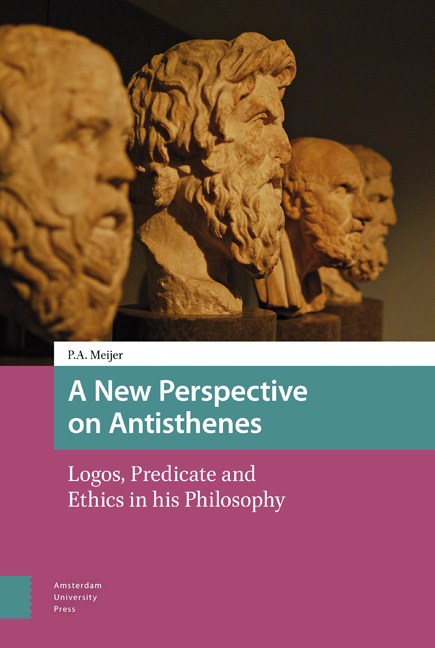Book contents
- Frontmatter
- Dedication
- Contents
- Preface
- Abbreviations
- Primary Sources – Editions Used
- Introduction
- Part I LOGOS AND PREDICATE
- Part II ANTISTHENES’ VIEWS ON THEOLOGY: HIS THEORETICAL APPROACH TO THE STUDY OF HOMER
- Part III ANTISTHENEAN ETHICS
- Epilogue: Antisthenes, an Assessment
- Appendix II The Speeches of Ajax and Odysseus
- Bibliography
- Concordance Giannantoni (SSR) – Caizzi (D.C.)
- Index
Epilogue: Antisthenes, an Assessment
Published online by Cambridge University Press: 24 December 2020
- Frontmatter
- Dedication
- Contents
- Preface
- Abbreviations
- Primary Sources – Editions Used
- Introduction
- Part I LOGOS AND PREDICATE
- Part II ANTISTHENES’ VIEWS ON THEOLOGY: HIS THEORETICAL APPROACH TO THE STUDY OF HOMER
- Part III ANTISTHENEAN ETHICS
- Epilogue: Antisthenes, an Assessment
- Appendix II The Speeches of Ajax and Odysseus
- Bibliography
- Concordance Giannantoni (SSR) – Caizzi (D.C.)
- Index
Summary
Analysis of the extant material shows that it is the veracity of the emerging picture of Antisthenes that matters. He is represented as a true and diligent follower of Socrates, despite all the negative points that Xenophon embeds in this portrait, such as his being a rather unpredictable and intruding person, a character that seems to be in line with his conduct in life. But Antisthenes must have grown into a master of his own character and spirit, becoming a philosopher capable of writing an impressive oeuvre itself much appreciated in antiquity given the witness of Cicero, and the recognition by Isocrates that this was his greatest rival for the duration of twenty years.
There is the risk of underestimating Antisthenes as a simpleton because of his at times extravagant or seemingly childish behaviour. Aristotle's description of the excluded contradiction as a silly thing, and his description of the viewpoint of the Antistheneans as ‘uneducated’, must not corrupt our perspective nor dominate our understanding. It must be underlined that Antisthenes was an interesting philosopher with interesting and logically coherent arguments, and perhaps an even better philologist in his time, although his interpretations of Homer are often more far-fetched than convincing. He was not averse to engaging in debate, for instance, with the rhetoricians Isocrates and Lysias, whom he attacked vehemently.
However, from a historical perspective his influence should not be overestimated either. This study has attempted to exhaustively retrieve what could be saved from the slippery ground of tradition, but a constant reminder is necessary that much of his influence in antiquity is no longer traceable since so many of his numerous works are lost. He does not seem to have been a constructive thinker in the sense of one who designs philosophical and cultural panoramas. Here, I have attempted to find the core of his philosophy, but what I have found is an amalgam of concepts that do not constitute a perspicuous whole, although they circle around wisdom and insight. The details of what this core actually entails remain obscure. For instance, at the centre of his educational activities, paideia, we find a form of ethics by example, not a thorough system.
- Type
- Chapter
- Information
- A New Perspective on AntisthenesLogos, Predicate and Ethics in his Philosophy, pp. 174 - 175Publisher: Amsterdam University PressPrint publication year: 2017

